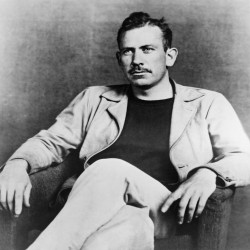
John Steinbeck
American Writer and Novelist
| Date of Birth | : | 27 Feb, 1902 |
| Date of Death | : | 20 Dec, 1968 |
| Place of Birth | : | Salinas, California, United States |
| Profession | : | Novelist, Writer, Journalist |
| Nationality | : | American |
John Ernst Steinbeck was an American writer. He won the 1962 Nobel Prize in Literature "for his realistic and imaginative writings, combining as they do sympathetic humor and keen social perception". He has been called "a giant of American letters.
Biography
Steinbeck attended Stanford University, Stanford, California, intermittently between 1920 and 1926 but did not take a degree. Before his books attained success, he spent considerable time supporting himself as a manual labourer while writing, and his experiences lent authenticity to his depictions of the lives of the workers in his stories. He spent much of his life in Monterey county, California, which later was the setting of some of his fiction.
Steinbeck’s first novel, Cup of Gold (1929), was followed by The Pastures of Heaven (1932) and To a God Unknown (1933), none of which were successful. He first achieved popularity with Tortilla Flat (1935), an affectionately told story of Mexican Americans. The mood of gentle humour turned to one of unrelenting grimness in his next novel, In Dubious Battle (1936), a classic account of a strike by agricultural labourers and a pair of Marxist labour organizers who engineer it. The novella Of Mice and Men (1937), which also appeared in play and film versions, is a tragic story about the strange, complex bond between two migrant labourers. The Grapes of Wrath won a Pulitzer Prize and a National Book Award and was made into a notable film in 1940. The novel is about the migration of a dispossessed family from the Oklahoma Dust Bowl to California and describes their subsequent exploitation by a ruthless system of agricultural economics.
After the best-selling success of The Grapes of Wrath, Steinbeck went to Mexico to collect marine life with the freelance biologist Edward F. Ricketts, and the two men collaborated in writing Sea of Cortez (1941), a study of the fauna of the Gulf of California. During World War II Steinbeck wrote some effective pieces of government propaganda, among them The Moon Is Down (1942), a novel of Norwegians under the Nazis, and he also served as a war correspondent. His immediate postwar work—Cannery Row (1945), The Pearl (1947), and The Wayward Bus (1947)—contained the familiar elements of his social criticism but were more relaxed in approach and sentimental in tone.
Steinbeck’s later writings—which include Travels with Charley: In Search of America (1962), about Steinbeck’s experiences as he drove across the United States—were interspersed with three conscientious attempts to reassert his stature as a major novelist: Burning Bright (1950), East of Eden (1952), and The Winter of Our Discontent (1961). In critical opinion, none equaled his earlier achievement. East of Eden, an ambitious epic about the moral relations between a California farmer and his two sons, was made into a film in 1955. Steinbeck himself wrote the scripts for the film versions of his stories The Pearl (1948) and The Red Pony (1949). Outstanding among the scripts he wrote directly for motion pictures were Forgotten Village (1941) and Viva Zapata! (1952).
Steinbeck’s reputation rests mostly on the naturalistic novels with proletarian themes he wrote in the 1930s; it is in these works that his building of rich symbolic structures and his attempts at conveying mythopoeic and archetypal qualities in his characters are most effective.
Quotes
Total 20 Quotes
When two people meet, each one is changed by the other so you've got two new people.
I have noticed that there is no dissatisfaction like that of the rich. Feed a man, clothe him, put him in a good house, and he will die of despair.
The human is the only guilty animal.
I have thought that men and women should never come together except in bed. There is the only place where their natural hatred of each other is not so apparent.
One pays for everything, the trick is not to pay too much of anything for anything.
To be alive at all is to have scars.
Socialism never took root in America because the poor see themselves not as an exploited proletariat but as temporarily embarrassed millionaires.
The free exploring mind of the individual human is the most valuable thing in the world.
The free exploring mind of the individual human is the most valuable thing in the world.
It has always seemed strange to me... the things we admire in men, kindness and generosity, openness, honesty, understanding and feeling, are the concomitants of failure in our system. And those traits we detest, sharpness, greed, acquisitiveness, meanness, egotism and self-interest, are the traits of success. And while men admire the quality of the first they love the produce of the second.
